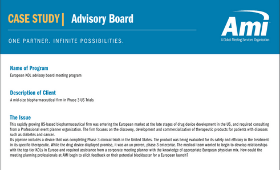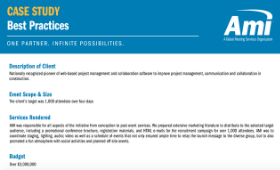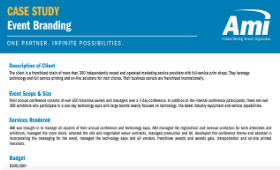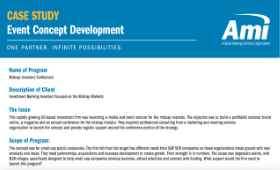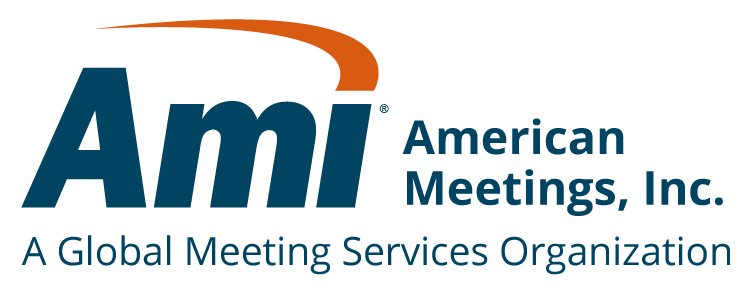
AMI Deploys PandaDoc to Streamline Sales and Business Operations as Customers Pivot from In-person to Virtual Events
With increased interest in virtual meetings due to pandemic, AMI sales teams accelerate deals on PandaDoc.
American Meetings, Inc.
Founded in 2002 by entrepreneur Andy McNeill, American Meetings, Inc (AMI) is one of the fastest-growing meeting services organizations. AMI helps clients achieve their business goals, amplify their brand, and stand out through live and virtual meeting strategies.
Reduced document create-to-send time from 3 days to 30 minutes
The Problem
With the sudden need to either cancel or reschedule in-person business events around the globe due to COVID-19, AMI experienced a surge in demand for its virtual meeting services. Their usual volume of incoming leads increased tenfold practically overnight, and they quickly realized that their existing sales document creation and management process would not be able to accommodate the influx of business, especially while working from home (WFH).
The process of sending a customized proposal alone involved multiple rounds of edits between sales reps, a creative designer, and management. AMI was also still handling their own transition to working from home which only further delayed the creation of sales collateral.
The Solution
PandaDoc proved to be the perfect remote, deal-acceleration solution for the AMI sales team. With its streamlined workflows, custom templates, and budgeting modules PandaDoc enabled AMI sales reps to successfully bypass the red tape and send tailored proposals to prospects in less than 30 minutes.
PandaDoc’s document tracking analytics and its ability to integrate with tools like HubSpot and Monday.com simplified the process of managing AMI’s sales pipeline for sales reps. The intuitive workflows, lightning-fast speed of document creation, deep analytical insights, and world-class customer experience made the adjustment to remote work much easier for the AMI sales team and helped them handle their increased workload. AMI plans to extend the benefits of PandaDoc to its entire organization, specifically its human resources and marketing departments.
“During these times, document automation has been key to maintaining business continuity. We’re proud that PandaDoc has become a vital resource for companies as they continue to adapt to the effects of the pandemic,” a PandaDoc team member commented. “We look forward to supporting AMI’s continued success by helping them improve the consistency and execution of business documents across their operations.”
The Result
With PandaDoc, the AMI sales team was able to decrease their document create-to-send time from 3 days to just 30 minutes. They created workflows that synergistically connected remote project stakeholders and accelerated their sales cycle. PandaDoc enabled AMI to efficiently serve its customer base and help them navigate the new normal of remote business meetings.
“PandaDoc will allow us to work quickly through our high volume of incoming leads. And, with a 100% remote workforce, the ability to create, edit and manage documents virtually will allow us to maintain business continuity throughout our operations,” said Andy McNeill, founder and CEO of American Meetings Inc. “We’re finding a lot of benefits to using PandaDoc and we know it’s going to be a strong asset for AMI. We’ve all had to adapt to a new normal but PandaDoc is going to make my team’s job easier now and well into the future when things settle down. It’s a game-changer and I look forward to finding new ways to use it throughout the company.”

